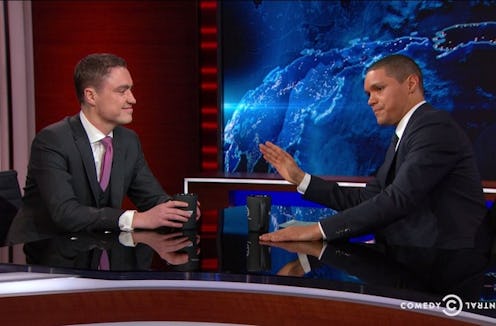News
'The Daily Show' Raises An Important Question

Estonia's Prime Minister Taavi Rõivas has caused some waves in America after he appeared on Trevor Noah's Daily Show to talk about how the small Baltic country is redefining civil bureaucracy for the new century. In Estonia, for example, citizens can vote online from anywhere, by securely logging onto the system with what is basically an enhanced social security card. Taxes now take three minutes to complete. Estonia is embracing the transformative power of technology to make government less intrusive. This begs the question: Why aren't we investing in online voting and other smart services?
Estonia's entire electronic bureaucracy hinges on an enhanced version of a Social Security card. Instead of paper, the card is plastic and embedded with electronics. Your citizen identifier number is attached to the card, and a unique cryptographic key is used to securely log on to the system. Once you log on, it is possible to complete a growing range of tasks related to government functions; you can even get your own business up and running in less than a day.
For those watching the election in Arizona, or who have endured lengthy lines stretching for hours at polling places in the past, the appeal of a secure, universal, online voting application is easy to understand. As Rõivas himself said in a talk at Duke University entitled A 21st Century State: Anything is Possible, “All the use of technology is not only because we are extremely tech-savvy, but mainly because we are practical people."
Easier access to voting is also a class issue; working class citizens can hardly afford (or may even not be allowed to) take hours off in order to exercise their democratic rights. So what is to stop the United States from using technology to make voting less of a hassle?
There seems to be an appreciable lack of desire on the part of the American people to allocate resources towards developing and employing citizen-facing e-services. Part of it may be the fact that after the disastrous launch of Healthcare.gov, people lost confidence in the government's ability to operationalize technology on behalf of the people, but another barrier is our hybridized form of government. Because of the American tradition of valuing state's rights, things like running elections are the responsibility of the state governments, and not the federal government.
Developing a secure online voting system at the national level may sound like a smart idea, but when you think about having to coordinate with all 50 state legislatures, well, that's when things would really get complicated.
That is absolutely not to say that just because something is difficult or complex, the American people should just ignore the problem. Instituting a system like electronic voting, would represent a huge change to how things have been done here for decades. In order for anything to happen, citizens need to stand up and demand action from their elected representatives. A Presidential-level commission to study Estonia's electronic services model and develop recommendations for the American people would, however, be a good start.
Image: Comedy Central